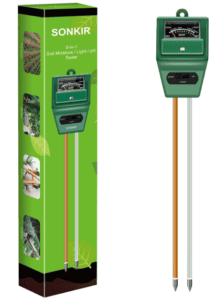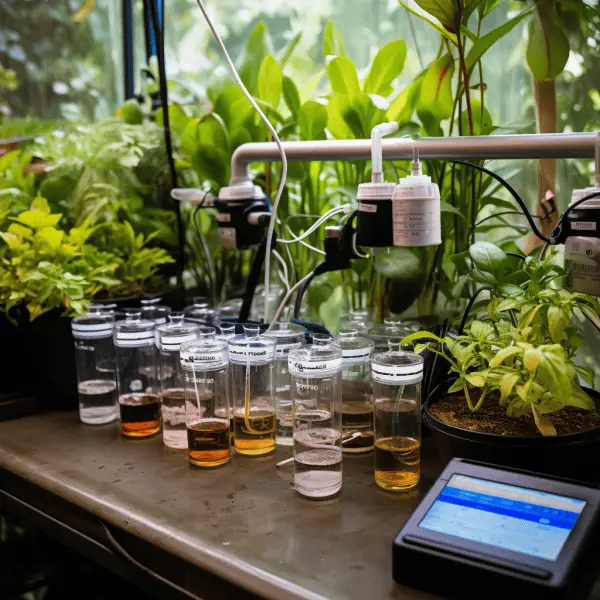As an avid hydroponic gardener, monitoring pH is one of the most important tasks to keep my plants happy and thriving. But with so many pH tester options on the market, it can be tricky to determine which models are truly the best for hydroponic pH control.
From inaccurate dipstick-style strippers to flimsy probe testers, I’ve tried my share of duds over the years. I’ll never forget the time faulty pH readings led to nutrient lockout and an entire crop of drooping, sad plants before I realized my cheap tester was to blame.
After going through multiple pH testing disappointments, I finally compiled my list of the top 5 most accurate, reliable pH meters specifically optimized for hydroponics. I’ve been impressed with how consistent and fuss-free these top-tier testers are – no more nasty pH surprises causing hiccups in my system.
If you’re looking for the best of the best when it comes to hydroponic pH control, read on for my reviews of 5 ultimate pH meters that will take the guesswork and frustration out of managing the critical pH balance that hydroponic plants depend on. Say goodbye to pH headaches for good.
KEY TAKEAWAY
pH testers are essential tools for hydroponic gardening as they help monitor and maintain the pH level of the nutrient solution. The pH level plays a crucial role in nutrient availability and plant health, and using a reliable pH tester can ensure optimal growth and yield in hydroponic systems.
Best pH Meter Choices for Hydroponics
Monitoring and adjusting pH is crucial for hydroponic success, making a quality pH meter essential gear. But with so many models available, choosing the right essential hydroponic tool for your setup can get confusing.
The optimal hydroponic pH range falls between 5.5-6.5 to allow proper nutrient absorption. Testers that provide quick, accurate readings in this zone take the guesswork out of maintaining balance.
High-end digital meters designed specifically for hydroponic pH monitoring offer convenience and reliability for growers. Or, economical strip-style testers work great for smaller hobby systems.
Whatever your budget and needs, selecting a tester that fits your gardening style will provide peace of mind that your nutrient solution environment is optimized for healthy plants.
Top 5 pH Testers for Hydroponics

Based on performance, features, and value, these 5 meters represent the best of the best when it comes to reliable hydroponic pH testing and control:
- Bluelab PH Pen – Accurate +/- 0.1 pH, ideal 0-14 range, replaceable probe
- Apera Instruments PH60 – Precise +/- 0.01 pH, compact, waterproof
- HM Digital COM-100 – Affordable, automatic temperature compensation, large LCD
- Sonkir Soil MS02 – Wide 0-14 pH range, automatic shutoff, replaceable probe
- Indigo Instruments Strips – Convenient dip strips for smaller systems, quickest
Bluelab PH Pen

The Bluelab pH Pen is consistently rated one of the most accurate and reliable pH meters for hydroponic monitoring. Trusted by professional growers, its quality and craftsmanship justify the higher price for those wanting the best.
This pen measures from 0-14 pH with incredible accuracy down to 0.1 pH. The replaceable probe maintains precision for years with proper cleaning and storage. Automatic temperature compensation ensures accurate readings.
Made in New Zealand, the Bluelab pH Pen provides lab-grade performance. For growers who can’t afford to take risks with their pH management, this rugged, well-calibrated meter is worth the investment for long-term use.
Apera Instruments PH60

For an affordable price, the Apera PH60 provides professional-grade accuracy at +/- 0.01 pH. The compact, waterproof design works great for hydroponic nutrient tank monitoring.
Fast, convenient automatic calibration and temperature compensation make the PH60 perfect for busy growers. The large LCD swivels for easy viewing. And the replaceable probe stays precise for over a year with care.
I recommend the Apera PH60 for hobbyists wanting an economical but highly precise meter from a trusted brand. For a mid-range price, it delivers superb functionality, accuracy, and durability.
HM Digital COM-100

The affordable HM Digital COM-100 makes pH monitoring simple with its intuitive automatic temperature compensation and large LCD display. It’s a great entry-level choice.
While not as advanced as the Bluelab or Apera, the COM-100 provides reliable 0.1 pH accuracy in an easy-to-use meter. The price under $50 makes it ideal for beginner hydroponic gardeners learning the ropes of pH control.
For a budget-friendly starter meter backed by a solid brand, the HM Digital COM-100 fits the bill. Once mastered, growers can upgrade to a more advanced model down the road.
Sonkir Soil MS02

I recommend the Sonkir Soil MS02 as a decent mid-range option for hydroponics. It measures from 0-14 pH with +/- 0.1 accuracy at a reasonable price point.
Helpful features like automatic shutoff after 8 minutes preserve the battery. The large backlit screen is easy to read. And the replaceable probe maintains accuracy longer than sealed models.
While not as heavy duty as the Bluelab or Apera, the Sonkir MS02 provides very reliable performance for the money. The 2-year warranty also ensures you’re covered.
Indigo Instruments Strips

For hobbyists with small hydroponic gardens, Indigo pH test strips provide an ultra affordable way to monitor approximate pH levels. Though not as precise as digital meters, they work in a pinch.
These thick test strips are more durable and heavy-duty than other brands I’ve tried. They change color to match a 0-14 pH chart with around 0.5 accuracy.
If you just need occasional, general pH tracking and can tolerate some variability, these hydroponic test strips get the job done. But for reliable precision, opt for an electronic meter.
Factors to Consider When Choosing a pH Tester
With many types of pH meters available, from digital pens to test strips, keep these key factors in mind when selecting one for your hydroponic needs:
- Required testing range – 0-14 full spectrum or 5.5-6.5 focused hydro range?
- Accuracy level needed – +/- 0.1 pH or +/- 0.01 pH precision?
- Budget – inexpensive strips vs. advanced meters?
- Ease of use – simple dip sticks or more involved digital calibration?
- Durability – replaceable probes vs. sealed one-piece models?
Your garden’s scale and sophistication will determine the ideal meter features. Evaluate options against your needs and growth goals.
Advantages and Disadvantages of Manual vs. Digital pH Testing
Both manual test strips and advanced digital pH pens offer unique pros and cons for hydroponic monitoring. Understanding the differences helps choose the right tester for your garden’s needs.
Manual Test Strips
Advantages:
- Inexpensive and accessible for hobby gardens
- Very quick and easy to use – just dip and read
- No batteries or calibration required
Disadvantages:
- Less accurate than digital meters – only +/- 0.5 pH precision
- Limited useful life before strips expire
- Harder to read exact values – relies on color matching
Digital pH Meters
Advantages:
- Laboratory-grade accuracy down to +/- 0.01 pH
- Replaceable probes last years with proper care
- Automatic temperature compensation
- Detailed pH and temperature display
Disadvantages:
- More expensive upfront cost
- Require occasional calibration for accuracy
- Probes are fragile and can break if mishandled
- Battery powered so need occasional replacement
For most growers, the precision of an advanced digital pH pen is well worth the small additional effort required. But budget-friendly dip strips work great for smaller hobby systems.
Calibrating and Maintaining Your Hydroponic pH Meter
To ensure optimal accuracy over the long-term, digital hydroponic pH pens need proper maintenance through regular cleaning and calibration. Following best practices keeps readings precise.
Begin by calibration weekly using pH 7 and pH 4 buffer solutions. Soak the probe in each solution briefly while adjusting the meter accordingly. This realigns accuracy.
Gently clean the probe tip regularly using distilled water and a soft cloth to prevent mineral buildup. Avoid abrasives that can damage the sensing bulb.
Always keep the probe tip moist between uses for preservation. Use storage solution or tap water – allowing it to completely dry out can impair function.
Replace probe fill solution monthly and the probe itself every 1-2 years for best longevity. With good care, quality digital pH pens provide years of reliable service.
Importance of pH Monitoring in Hydroponics
Maintaining the ideal 5.5-6.5 pH range is absolutely essential for hydroponic health and preventing nutrient deficiencies or toxicity. Regular monitoring using a quality pH meter removes all guesswork and safeguards your plants.
Hydroponic nutrients only properly dissolve and become available for plant roots to absorb within a tight pH range. Too high or low prevents absorption, causing deficiencies.
For example, calcium, magnesium, and micronutrients bind up under overly alkaline conditions above 6.5 pH. Manganese, iron, copper, zinc, and boron become locked out below 5.5 pH in acidic solutions.
With pH balanced between 5.5-6.5, all essential macro and micronutrients can reach plant roots as intended. Yields, fruiting, and overall vigor are maximized under these optimized conditions.
Don’t leave nutrient availability up to chance – a precise pH meter provides cheap horticultural insurance for your hydroponic garden’s success.
Comparing Different pH Tester Brands for Hydroponics
While many companies offer hydroponic pH meters, 3 brands stand out for consistently delivering high performance and reliability:
- Bluelab – A leader in accuracy and quality, with replaceable probes and trusted reputation. Top choice for serious growers.
- Apera Instruments – Affordable lab-grade quality with exceptional accuracy and value. Great for hobbyists.
- HM Digital – Budget-friendly brand with a wide selection of entry level meter options under $50.
Other decent brands include Oakton, Sonkir, and Hanna. Avoid generic unbranded meters which often lack quality control and after-purchase support.
When investing in an important tool like a pH meter, choose an established company that stands behind their products. This ensures you’re covered if any issues arise down the road.
FAQs About pH Testing and Monitoring in Hydroponics
Here are answers to some frequently asked questions about managing pH in hydroponics using digital meters or test strips:
How often should I check pH levels?
- Test daily or every other day to catch any pH fluctuations quickly.
What is the ideal pH range for most hydroponic plants?
- Within 5.5 to 6.5 pH allows proper nutrient absorption.
How accurate do pH readings need to be?
- Digital meters that can measure within +/- 0.1 pH are ideal for precision.
Can test strips be used instead of a digital meter?
- Yes, strips work for hobbyists though they are less precise (+/- 0.5 pH).
How do I adjust pH up or down if needed?
- Use pH Up or pH Down solutions to safely raise/lower nutrient solution pH.
How do I calibrate and maintain meter accuracy?
- Calibrate weekly and clean probe regularly. Replace probe yearly.
What causes pH fluctuations in my system?
- Transpiration, top-offs with untreated water, microbial activity, and other factors.
How can I help stabilize pH levels?
- Use pH buffers, reverse osmosis water for top-offs, and consistent monitoring.
Optimizing pH Management Based on Your Hydroponic Approach
The ideal pH management method also depends on factors like your hydroponic system type, scale of operation, and automation level.
For smaller manual gardens, inexpensive liquid or strip testing options tend to suffice. Larger recirculating setups will benefit from automatic pH controllers.
If adding top-off water frequently, having an efficient way to regularly check pH is key to maintaining balance. Systems with less hands-on monitoring can utilize probes.
Consider how your specific hydroponic garden operates, then select pH testing and correction approaches that integrate smoothly into your system’s existing workflows.
Conclusion
In closing, precise pH control is absolutely essential to hydroponic health and preventing issues like nutrient deficiencies. With a top-quality pH meter designed for hydro from brands like Bluelab or Apera, you can easily maintain optimal pH levels for vigorous growth.
Consider factors like accuracy, calibration methods, probe quality, and reliability when selecting your hydroponic pH tester. And choose an appropriate measurement range for your setup – either 0-14 or centered on the optimal 5.5-6.5 hydro range.
Investing in an accurate, durable pH meter provides peace of mind that your nutrient solution environment is perfectly optimized for your plants to thrive. Never lose a crop again to pH imbalance!
Was this helpful?

Crystal Erickson is an agriculture enthusiast and writer with a passion for sustainable farming practices and community development. Growing up on a family farm in rural Iowa, Crystal developed a love for the land and a deep appreciation for the hard work and dedication required to make a farm successful.
After completing a degree in Agriculture and Environmental Science from Iowa State University, Crystal began her career as an agricultural journalist, covering stories and issues related to modern farming practices, crop management, and livestock production. She quickly established herself as a respected voice in the industry, known for her insightful reporting and thoughtful analysis.
Over the years, Crystal has written for a variety of publications, including Farm Journal, Successful Farming, and Modern Farmer, as well as contributing to several academic journals focused on sustainable agriculture and community development. Her work has been recognized with numerous awards, including the Iowa Farm Bureau’s Young Farmer Achievement Award and the National Association of Farm Broadcasting’s Farm Broadcaster of the Year.


